BTB Speaks to
Kardo
Unapologetically Made in India—Kardo, founded by Rikki Kher, is redefining global menswear through a modern lens of Indian craftsmanship, sustainability, and collaborative storytelling.
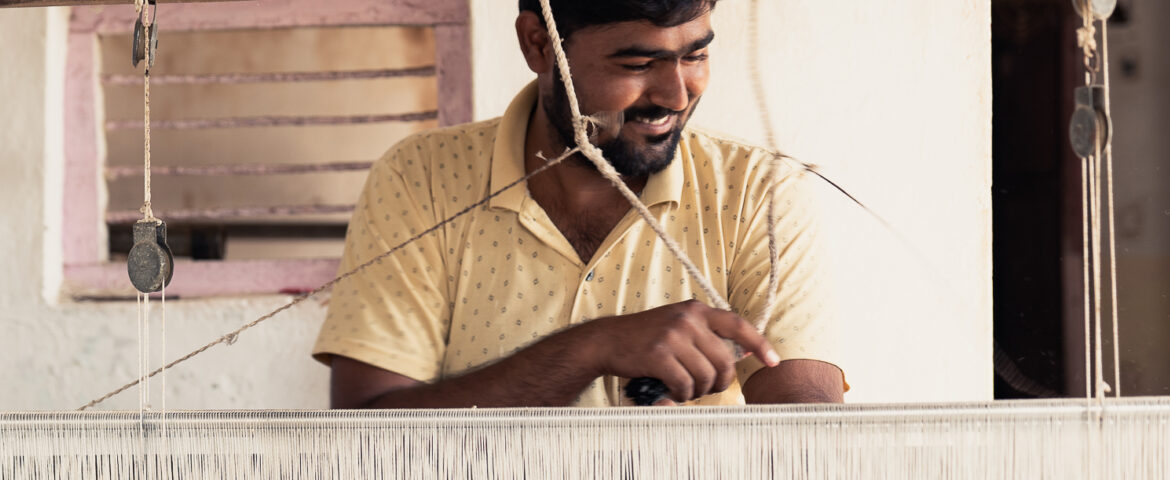
Written by: Manica Pathak
Today, the gravitas of Made in India holds more than just a label or a marker of geographic origin. Yet, when Blur The Border speaks to Rikki Kher, founder of Kardo, a contemporary menswear label known for its handmade textiles rooted in Indian craftsmanship and sustainability—the perception was far from the same a decade ago. “When I first showcased Kardo in New York in January 2014, people loved it. They thought the collection was beautifully made. But then they’d ask, ‘Is it Japanese?’ And I’d say, ‘No, it’s from India.’ And suddenly, they’d lose interest and walk away. I’d ask why, and they’d say, ‘We’ve worked with India before—it’s a nightmare: late deliveries, quality issues’, you name it,” says Rikki.
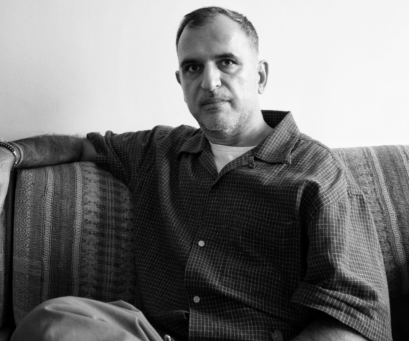
Rikki Kher (Founder of Kardo)
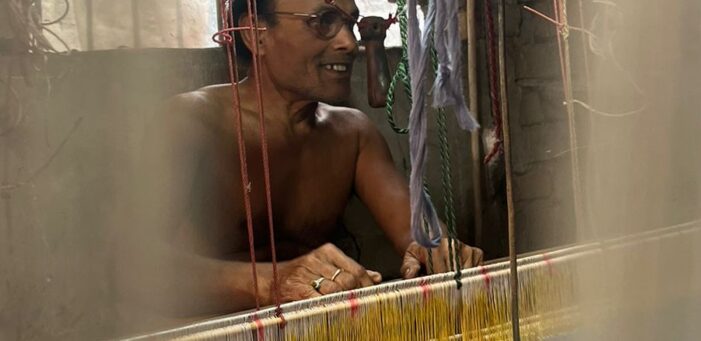
At this point, for Rikki, who was born and brought up in London, pivoting towards the conventional path seemed like the safer bet.“Someone suggested I label the brand ‘Kardo London’ or ‘Kardo Paris.’ Since I’m from London and my wife is from Paris, they said it would sell better. And I thought, okay, this is business—I need to sell.”But in retrospect, his visits to India had already left an irreplaceable mark on him, “It gave me a deeper understanding of who I am—why my parents are the way they are, why I think the way I do.” So, instead of conforming to industry biases, it became about dismantling them. ”When I discussed it with my wife, she said, “Sure, you could do that, but then you’d just be like every other brand. And that’s when I said, I'm going to be unapologetically from India.”
Kardo’s journey, however, was quite serendipitous, the genesis of which stemmed from the principles of Rikki’s personal quest for well-made, and well-fitting clothes for himself, “In India, fashion had a bit of a ‘laissez-faire’ attitude—fits weren’t always precise. Back then, fast fashion brands had just arrived in India and the market was dominated by brands like Ralph Lauren and Giorgio Armani, but they weren’t affordable and didn’t reflect our culture. Everything was imported,” he says. Moreover, despite being surrounded by India’s rich heritage of indigenous textiles, Rikki found that these resources remained surprisingly elusive to the menswear category.“Even when you look at a handloom sari or a textile technique traditionally worn by women, I wasn’t seeing men embrace those fabrics. I kept thinking, why can’t I wear something that represents who I am? When I started making clothes for myself, people would comment, ‘Oh, that’s nice—you should do this,’ or ‘I’d like to buy one.’ That’s when I began exploring the idea of an Indian menswear brand.” But even though Indian craftsmanship became the epicentre of Kardo as a label,Rikki wasn’t content with simply celebrating Indian heritage through fabric. “If I wanted to create an Indian brand for the international market, the only way to do that was through exceptional quality and fit,” he says and continues. “Then came a eureka moment in a Khadi store in Jaipur. I saw this beautiful textile—one that truly represented India’s independence, its struggle, and Gandhianism. It was a real identifier of who we are. But at the time, Khadi was associated with bureaucratic, unflattering clothing. I thought, why not use it in a more contemporary way?”
”When I discussed it with my wife, she said, “Sure, you could do that, but then you’d just be like every other brand. And that’s when I said, I'm going to be unapologetically from India.”
The next steps were quite pivotal—engaging with artisans and reshaping the modus operandi. “I remember buying saris, cutting off the pallu, and asking weavers to recreate the design separately. They thought I was crazy. We couldn't use the entire fabric in its original form, and that was the beauty of it. I wanted to take a specific section of a sari, for instance, and turn it into a shirt.” The curiosity and passion eventually catalysed Rikki to investigate further. “That led me to the deeper exploration of identifying weavers—understanding who these craftspeople are, the clusters they belong to, their techniques, processes and what their work signifies.”
Today, even though Kardo honours traditional weaving, dyeing and printing techniques in India for their collections, using fabrics such as Ikat, Natural Indigo Denim, Shibori and Chikankari embroidery, Rikki is thinking ahead—to elevate the traditional siloed nature of Indian craftsmanship and encourage a more collaborative ecosystem at the grassroots. “We're also trying to bring artisans and cultures together. In the entire collection of Autumn 24, we brought Assamese weavers together with Ajrakh printers in Gujarat. These artisans have never traditionally worked together. So, if we can merge two creative clusters or crafts, how will that look? What will happen when we do that? That’s what we’re trying to explore.”
Looking closely at Kardo’s collection, it becomes clear that the label isn’t just referencing heritage—it’s curating a living archive. While Rikki is keen on exploring newer iterations of traditional craft techniques, many of Kardo’s pieces are created in collaboration with 10th-generation, award-winning artisans like Sufiyan Ismail Khatri and his team in Ajrakhpur, as well as using 200-year-old archival prints from 4th-generation block printer Suraj Narain Titanwala. He says, “We wanted to start with the artisans’ expertise—what the artisans have mastered over generations.” As he continues to share insights, he gestures to the oversized camp-collared shirt he’s wearing from Kardo’s Spring/Summer collection during the interview, “The world doesn’t always understand the intricacies behind what we create. Many people know about it, but does the average consumer realize that this piece was made using an Ajrakh print on Matka silk from Bengal? And what exactly is Matka silk? What is Ajrakh printing? Who is the Ajrakh printer?”



But passion alone isn’t enough to build a strong brand presence. There are several other key elements that Kardo has successfully managed to get just right to carve out its place towards the global map. According to Rikki, even the seemingly minor details play a crucial role in shaping the bigger picture,“You can’t just ship a box with the tape all mashed up. Presentation is half the battle. Even the label placement has to be perfect. At times, I’d walk into my workshop and tell my tailors, "The label is two millimetres too high on the right side," and they’d say, "Chalega."And I’d say, "No, you don’t get it." The proof of validation ultimately has made all the effort worthwhile. “Once the tailors saw the reaction to precision, they started to understand. It took a couple of years to train people. The stitching had to be perfect throughout. Buttons had to be sewn on correctly. Packaging had to be top-notch. We’re competing against international brands with high standards, so we had to match them. While a lot of people didn't understand that I was lucky that I did because I grew up and worked abroad. That was probably my competitive advantage,” he says.
Even after showcasing at international fashion weeks and securing stockists in countries like Belgium, Australia, France, Germany, Hong Kong, and Japan, Rikki’s core belief has remained intact, perhaps one of the reasons that makes him a visionary, more than just an entrepreneur. “My swansong is actually being involved in real India and bring it to the world so people can acknowledge the country is home to true craftsmanship. Of course, we want to be commercially successful, but it’s also about creating a circular ecosystem where, as we grow, artisans gain more recognition and opportunities. If we were to step away tomorrow, we would want the artisans to continue thriving. And If the artisans we collaborate with receive more work, how does that affect us? It’s a win-win”, he asserts. In many ways— as Rikki continues to share, the industry has also exploited their skills—sampling textiles from the artisans only to have them mass-produced elsewhere at lower costs. “We never did that. If we sampled a textile with an artisan, we made sure to produce it in bulk with the same artisan. Many artisans do multiple jobs. They’re agriculturalists, they’re weavers, they might have another source of income. It’s about assuring them that we’ll provide enough work to support their weaving and even create opportunities for the next generation—and crucially, we ensure fair and timely payment,” he says.
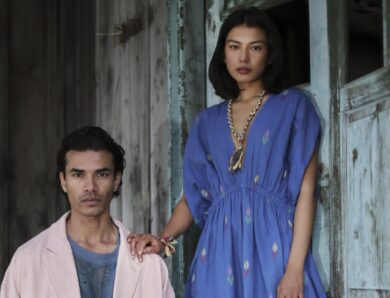

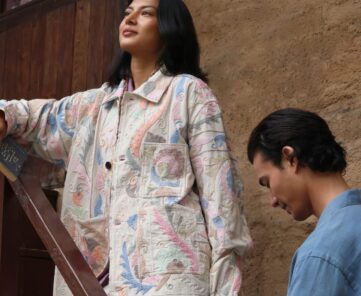
With over a decade of Kardo’s presence, the brand has attracted a spectrum of customers, particularly across borders. “We have a massive diaspora following worldwide. I recently did a talk in New York, and people came up to me afterwards and they told me, "You make us feel proud of where we’re from."That really struck me. I was born in the ‘70s in Britain, and here were people—probably third-generation Americans—still struggling with their identity. It made me realize that’s part of what we’re doing—giving people a sense of pride in where they’re from,” shares Rikki.
But there is still much work to be done—a collective effort that shouldn’t rest solely on brands but must be equally shared. As the conversation deepens, Rikki reflects on the growing disconnect between consumers and the process behind what they wear—and why bridging that gap has never been more crucial. “People aren’t always willing to invest time and effort in understanding this. With Instagram and the rapid rise of fast fashion, it’s become even harder. That’s why storytelling is so important. The more we show how things are made, the more consumers will understand and resonate with these narratives. It’s not just about presenting a product that looks beautiful or fits into current fashion trends. If consumers see the process, they might appreciate it more, or maybe they won’t—we can’t dictate how people think. Some will resonate with it, and some won’t. You can’t win everyone over. But the key is to nurture those who believe in what you do and build a connection with them." Beyond the role of the consumer, he shifts focus to another critical piece of the puzzle—the need for infrastructural and institutional support to truly sustain the craft economy. “As for the government, Our textile heritage is second to none and if the government wants cities to be less crowded and rural areas to bounce back, they need to support craft and recognize that an incredible number of people need employment. Yes, India will have to industrialize faster, but can't we counterbalance that with investment in craft? For example, we were weaving a herringbone cotton fabric and introduced it as a basic in our collection. Our first order was 120 meters. After which we received an order for 2,000 meters. The weaving cluster we worked with only had two weavers capable of making this fabric. So I said, "I’ll give you a blanket order of 5,000 meters a year. Let’s train two or three more weavers to meet the demand." But it also requires a combination of government support, investment, and market demand. We have the market—I show in Paris, London, New York, and Tokyo, we have the visibility and can secure orders. But how are we going to produce at scale? We need support. As much as we try to backweave clusters, weavers also need guarantees to keep them from migrating to cities.”
As the conversation draws to an end, what emerges from Kardo’s journey is also an evocative portrait of a founder.Having spent over two decades in India, including ten years in large-scale industrial garment production, he brings with him an innate understanding of the industry. Kardo isn’t just a brand in his hands—it’s the distilled outcome of years of learning, unlearning, and evolving. “My twenties were impatient, my thirties were impatient, and maybe by my forties, I had developed a sense of calm. I lost money, made some, had brilliant experiences, and every challenge taught me something valuable. All of that has helped me navigate how I run this company—and its probably that last one I'll run,” he says.